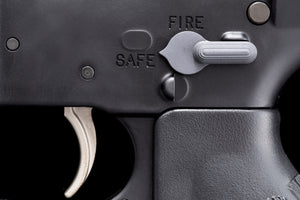Whether you’re going to conceal carry, participate in matches, or go hunting, firearm safety needs to be a top priority. The best type of gun owner is a responsible one.
NRA Gun Safety Rules
The National Rifle Association (NRA) has three key tenets for gun safety:
- Always point the gun in a safe direction
- Always keep your finger off the trigger until you're ready to shoot
- Always keep the gun unloaded until it’s going to be used
When it comes to storing a firearm, it’s best to have it unloaded before doing so. Guns and ammunition should be stored in separate, locked storage cases or safes in your home. When in doubt, always treat a firearm as if it is loaded.
STORING A GUN IN YOUR VEHICLE
Even if you have a concealed carry permit, you may not be able to wear your firearm everywhere you go. If that’s the case, you can safely store your firearm in your vehicle in a number of ways.
First of all, you should always conceal a firearm stored in your car. Leaving it in plain sight may not be against the law where you live, but it opens you up to passersby reporting the gun, or stealing it.
Install a Concealed, Locked Container
You can have a custom firearm safe installed in your vehicle that’s made to look like a regular part of your car. It could be within the glove compartment, or perhaps made to look like a center console. Regardless, it won’t be discernable as anything of note to passersby.
Install a Lockbox
If a custom build isn’t the ideal solution for you, there are lockboxes you can purchase and install inconspicuously in your vehicle. These may slide under a front seat, under the dashboard, or be placed in the trunk of your vehicle. The lockbox should be secured to your vehicle so it can’t be picked up and taken away with your firearm inside.
Keep in mind that a lockbox is not the same as the glove compartment of your vehicle, even it is locked. The glove box can easily be pried open, so it’s not an ideal place to safely store your firearm.
Be Aware of Your Surroundings
No matter what type of shooting you're engaging in, be aware of your surroundings. You might have the target in your site, but what’s behind it or in the periphery?
Know Your Firearm
Do you know how to load and unload ammunition in your firearm? What do you know about taking it apart and cleaning it? In order to keep your firearm functioning at its best, get to know how it operates and how to take care of it. Familiarize yourself with any modifications that change how the gun handles.
Wear the Right Gear
Be sure you’re protecting your eyes and ears when shooting. Invest in tactical gear such as glasses, earplugs, or noise-canceling headphones.
Firearm Safety and Children
There’s nothing wrong with discussing firearm safety with children. In fact, satisfying their curiosity about locked cabinets or gun vaults may be the best approach. If you have children in your home, here are some tips for educating them about firearms:
- Show your children an unloaded firearm so they’re familiar with it
- Discuss the importance of not picking up a gun that they come across in your home or anyone else’s
- Teach them to tell an adult if they see an unsecured gun in a home
When teaching your children about using a firearm themselves for hunting or recreational shooting, remind them of the fundamental safety rules of handling a gun. Teaching kids to handle a gun as if it’s always loaded is a good practice that encourages them to always point the gun in a safe direction and to keep their finger off the trigger until they’re ready to shoot.
Start Small
A good way to introduce your teen to handling a firearm is to start with air rifles or BB guns first. They’ll learn about loading and aiming a gun in a less high-stakes environment, which can be better for their nerves.
When your teen is ready to move on from a low-velocity gun, use your best judgment when picking their next, youth-appropriate firearm. Many experts recommend starting with a .22 caliber rifle or pistol for teens, as it has less recoil to absorb.
As with anything, keeping an open discussion going with your children is one of the best ways to help them navigate a situation. Gun safety should be no different than teaching your kids about safely crossing the street or learning to drive. There may be risks, but with the right knowledge, they can be prepared to handle a firearm responsibly.


